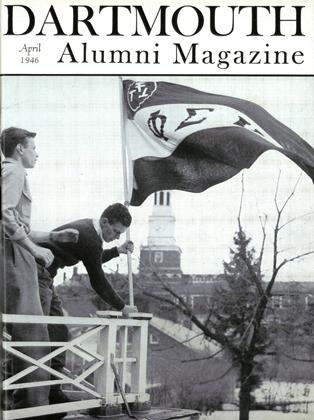ONE OF MY STUDENTS recently loaned me W. Somerset Maugham's Introduction to Modern English andAmerican Literature, issued by the Blakiston Company, Philadelphia. It sells for a dollar and one gets 618 pages of well selected prose and poetry. Maugham has catholic taste and what he selects is always entertaining reading. The writers selected range from Eudora Welty and John Collier to John Jay Chapman and Robert Frost; there are poems, essays, short stories, letters, and the longest piece in the book is Henry James' "The Beast in the Jungle." On page 154 I found two lines by Hilaire Belloc which I hope may be my epitaph:
When I am dead, I hope it may be said: "His sins were scarlet, but his books were read."
My book of the month is Roy Meredith's Mr. Lincoln's Camera Man, Mathew B. Brady (Charles Scribner's Sons, 1946). This is a rather heavy tome with over 400 illustrations from Brady originals, a hundred and twenty of which have never been printed before. Here one gets a history of the United States from about 1840 to 1880. There are many Civil War pictures as graphic as if they were taken a few months ago with the most modern camera. There is a magnificent Daniel Webster photograph, his last, which is more revealing of the man than any I have seen before.
I his is the first full biography of a neglected American genius who made photographic history with his "little red wagon" When he followed the Union armies in the Civil War. Any student of American history who wants to know exactly how Morse, the inventor of the telegraph, Andrew Jackson, Calhoun, Clay, Brigham Young, Poe, Cooper, Whitman, Lincoln, Ben Butler, Custer, Jefferson Davis, Grant, Lee, Hayes, Carnegie, Harrison, and many other Americans looked, will find them here. There is no retouching, no "soft focus" to blur and glamorize the subject, but honest portraits. Mathew B. Brady was a genius long before Mr. Steichen was born and if you are fortunate enough to obtain a copy of this book you will have many rewarding hours ahead of you. The text is not distinguished but the pictures are magnificent.
If you have a fishing friend (and who hasn't?) he would get some laughs from ToHell With Fishing, with cartoons by H. T. Webster, text by Ed Zern, and an introduction by Corey Ford. The cartoons are much better than the text but it would be a task even too great for the late Robert Benchley to match the innocent guile of H. T. Webster. Here is a sample of Mr. Zern: "Statistics show that one-legged fishermen seldom fall down while wading. I only know one one-legged angler personally. He lost the other one while poking good-natured fun at a buzz saw, and had it replaced with an aluminum job, made by the Dodd Artificial Limb Company. He is very proud of it. When somebody suggested that he turn it in during an aluminum drive, he indignantly refused. "I don't give a good Dodd gam!" he said.
So you can see what you are up against. Webster never lets you down.
As I am an incorrigible Angela Thirkell fan, I have been whispering hosannahs quietly to myself while reading her latest chronicle of Barsetshire: Miss Bunting (Knopf, 1946). Miss Bunting is a governess who is never at a loss; around her are Mr. Adams and his daughter Heather, who improves with every book; the old vicar and his son; the gentle Ann; lovely Jane Gresham with a problem honestly faced; and hosts of characters who flit in and out in the incomparable Thirkell manner. Not the least of these is the maid Gradka from Mixo-Lydia who is always dreaming of her countrymen marching into Slavo-Lydia to "kill oil the men and seduce oil the women." Here are 295 pages of fun for the price of $2.50, and, as usual with Knopf books, the printing and binding are in excellent taste.
I have read the English edition of Siegfried Sassoon's Siegfried's Journey which Viking is soon to bring out here. He writes so well that this autobiography from 1916 to 1920 is delightful from beginning to end. You may remember him as the author of Memoirs of a Fox Hunting Man which was a minor classic of the twenties; and also his Memoirs of an Infantry Officer. He is very good. On page 183 there is an excellent vignette of Robert Frost.
A rather complete account has appeared in England of the part the Navy played in the great undertaking of the invasion of Normandy. This book is titled after the code for the task: Operation Neptune. It is written by Commander Kenneth Edwards; Collins is the publisher. Sober and exact, this will please any naval man.
 View Full Issue
View Full Issue
More From This Issue
-
 Class Notes
Class Notes1918
April 1946 By ERNEST H. EARLEY, DONALD L. BARR -
 Article
ArticleLabor Marches With the Times
April 1946 By MALCOLM KEIR, -
 Article
ArticleTHE NEW CURRICULUM
April 1946 By PROF. HUGH S. MORRISON '26, -
 Class Notes
Class Notes1917
April 1946 By MOTT D. BROWN, DONALD BROOKS -
 Class Notes
Class Notes1911
April 1946 By NATHANIEL G. BURLEIGH, EDWIN R. KEELER -
 Article
ArticleEducational Aims
April 1946 By PROF. CHARLES LEONARD STONE '17
HERBERT F. WEST '22
-
 Article
ArticleHanover Browsing
October 1937 By HERBERT F. WEST '22 -
 Article
ArticleHanover Browsing
December 1938 By HERBERT F. WEST '22 -
 Article
ArticleHanover Browsing
December 1945 By HERBERT F. WEST '22 -
 Article
ArticleHanover Browsing
March 1947 By HERBERT F. WEST '22 -
 Article
ArticleWestholm Publications
December 1956 By HERBERT F. WEST '22 -
 Article
ArticleHanover Browsing
June 1958 By HERBERT F. WEST '22








